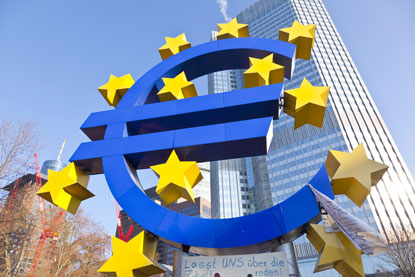Since the world plunged into financial crisis in 2008, the ECB entered into a period of unprecedented and unconventional economic intervention.
The EU branch of the transparency NGO said this, and the fact that its decisions increasingly stray into political territory, create an “uneasy” tension between the need for independence and scrutiny at the ECB.
“While the ECB has saved the single currency more than once, the absence of a eurozone finance ministry as a counterpart means that the bank has had to stretch its mandate to breaking point,” said Leo Hoffman-Axthelm, research and advocacy coordinator at Transparency International EU (TI-EU).
The report highlighted the increasingly political dimensions of what, on the surface, are technical ECB decisions.
These relate to a number of sweeping new powers the bank has made use of in order to respond to the financial crisis, including acting as a lender of last resort to banks, sovereign bond buying and quantitative easing – a programme worth €80bn per month at its peak.
These unprecedented interventions appear to be paying off, but TI-EU stressed that the bank’s accountability framework has not kept pace with its new activities.
As a result it has enjoyed little oversight while going far beyond its relatively narrow mandate and making extraordinarily influential decisions.
Responding to the report, Mario Draghi, president of the bank, agreed good conduct and governance were essential to public trust and that European institutions have a duty to strengthen accountability and show they meet their objectives.
He added that the ECB has “always been open to a balanced dialogue with stakeholders, including the public”. In recent years, the bank has made improvements to transparency, publishing the minutes of governing council meetings for example.
However, TI-EU highlighted occasions where the ECB has not communicated its technical decisions, despite these having significant political consequences.
For instance, during the Greek crisis the ECB stopped accepting government bonds as collateral for borrowing from Greek banks, forcing Greece’s banks to borrow from their national central bank under a procedure known as Emergency Liquidity Assistance.
ELA enables national central banks to loan money at their own risk rather than sharing this with other eurozone banks, but the upper ceiling of assistance that can be provided is set by the ECB.
TI-EU said the ECB, as a member of Greece’s troika of creditors, used this control to exert pressure on the Greek government during bailout negotiations, highlighting the tension between its technical monetary role and political role.
Despite their political impact, the ECB did not communicate its ELA decisions publicly at the time.
Similarly, in 2011, the ECB threatened to end ELA if Ireland did not submit to a bailout programme, and its reform conditions. In what TI-EU said were “secret letters” to Spain and Italy, it made a bond-buying programme conditional on specific reforms to be achieved by a specific date.
Meanwhile, since launching its quantitative easing programme – an initiative TI-EU noted was unconventional, experimental and has wide-ranging consequences – the euro system’s balance sheet has swelled dramatically. As of mid-march, it showed assets worth almost €4tn.
“If the euro is to survive the next crisis, then EU member states need to stop hiding behind the technocrats at the ECB, overcome political inertia and get serious about reforming the eurozone,” said Hoffman-Axthelm.
The ECB is not the only central bank to take extraordinary measures in recent years, with the US Federal Reserve spearheading quantitative easing and Japan’s central bank resorting to negative interest rates.
A recent survey of economists found that many believed the use of unconventional policy tools had significant implications for bank independence in future.














